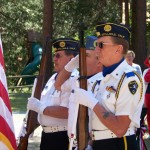Editor’s note: In light of the recent closed dealings at both Idyllwild Fire Protection and Idyllwild Water districts, I’m taking a break again this week to let my newspaper colleague, Brian Hunhoff, speak his mind on open government.
Ten Commandments for open meetings
By Brian J. Hunhoff
“I think heroic deeds were all conceived in the open air” is a quote from Walt Whitman’s “Song of the Open Road” — a cheerful 1856 tribute to freedom and the great outdoors.
Hopefully, Mr. Whitman would have approved use of his prose to promote open, well-aired government. It’s unlikely the great poet favored government secrecy and closed-door meetings. He also wrote, “Out of the dark confinement, out from behind the screen!”
For today’s purposes, Whitman’s “screen” represents the executive session — a self-important term for a classic oxymoron: closed public meeting.
Too many elected boards seek every opportunity to meet out of sight of the public they serve. Some schedule executive sessions as a regular agenda item. Some hold up to three executive sessions in a single meeting. Some have executive sessions that last longer than the open portion of their meeting.
In most cases, executive sessions do not violate open-meeting laws. The closed-door discussions are often suggested or encouraged by an elected board’s legal counsel.
But legality and necessity are two different things.
Consider the following list from our Fourth Estate counsel to county commissions, city councils and school boards everywhere on executive sessions and general government openness. Citizens should hold their elected officials to the standards below. These are Ten Commandments for Open Meetings:
ONE: Do not gather as a quorum outside of regular meetings, and do not hold special meetings without giving at least 24 hours public notice.
TWO: Do not habitually add last-minute items to the agenda, and do not act on anything not listed on the posted agenda.
THREE: Do not abuse the litigation excuse for executive sessions to speculate about possible or imagined lawsuits.
FOUR: Do not stretch the personnel excuse for executive sessions to discuss policy issues. Example: Creating a new position or changing a department’s job descriptions are policy decisions and not appropriate topics for a closed meeting.
FIVE: Do not dial up the “negotiations” excuse to suddenly exclude the public from discussion of controversial issues that were previously aired thoroughly in open session.
SIX: Do not allow executive session conversations to stray to other topics.
SEVEN: Do not violate the spirit of the open-meeting law with frequent phone, email or text dialogues with other members. Reach consensus at the meeting.
EIGHT: Do not make a habit of whispering or passing notes at meetings. You were elected to speak for us. Tell what you have to say out loud and proud!
NINE: Allow public input at every meeting. Include it on every agenda.
TEN: Be as transparent as possible. Do not hold executive sessions simply because counsel advised it is “legal” to do so. Ask yourself: “Is it absolutely critical we discuss this privately?”
That should be the test because legality and necessity are two different things.
We appreciate our local commissioners and board members. They serve for minimal compensation. They make tough decisions. They sometimes lose friends and make enemies. Their dedication to community is admirable.
We simply ask elected officials to think twice before kicking the public out of public meetings.
Strive for fewer. Less is more. A closed meeting should be a rare occasion, not a habit.
Brian Hunhoff writes for the Yankton County Observer in South Dakota. His columns about open government won the 2015 Freedom of Information award from the National Newspaper Association.










